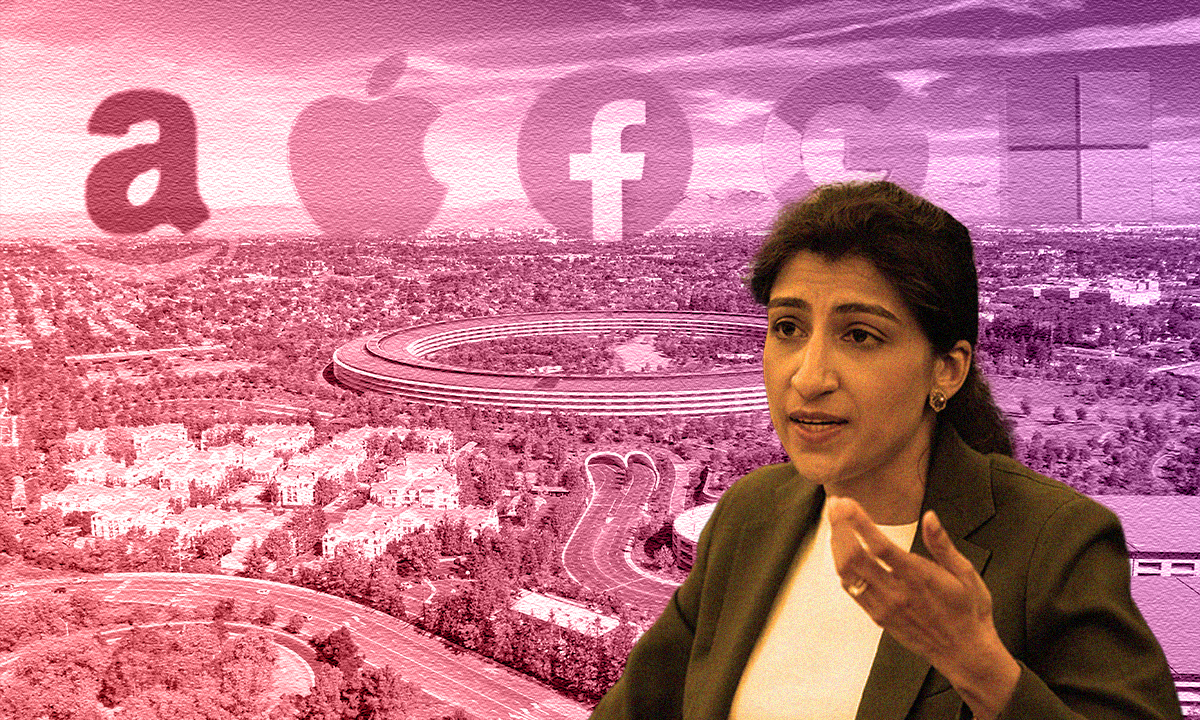The Limits of Lina Khan and the ‘Neo-Brandeisians’
Democratic donors want to gut Biden’s antitrust brain trust. But even if they survive a Harris victory, what can they really accomplish? Graphic by Truthdig. Images sourced via AP Images and Adobe Stock
Graphic by Truthdig. Images sourced via AP Images and Adobe Stock
Last month, two billionaire donors put pressure on Kamala Harris to oust Federal Trade Commission Chair Lina Khan for her allegedly anti-business agenda. Large swaths of the U.S. left penned op-eds in defense of Khan, who they see as a brave hero standing up to Big Tech on behalf of everyday Americans. According to the U.S.-European tech “left,” traditional antitrust measures like those advocated by Khan and other “neo-Brandeisians” — named after early 20th century Supreme Court Justice Louis Brandeis — are the most effective tools for leveling an economic landscape dominated by technology giants.
This school of antitrust is grounded in the belief that the benevolent hand of the state can, through proper regulation and guidance, create a “fair” and “competitive” capitalist economy that, in the modern iteration, can prevent Big Tech from steamrolling the planet. However, the historical record demonstrates the opposite. In 2022, the first and only comprehensive study of industry concentration in the United States found that corporate concentration had persistently increased between 1918 and 2018 across all decades. Consistent with analyses of everyone from the neoliberal economist George Stigler to Karl Marx, the authors note, the culprit appears to be economies of scale. This undermines the universal contention of neo-Brandeisians that the neoliberal “Chicago School” of antitrust — which came to prominence and influence in the 1970s — is to blame for the corporate concentration we see today by undermining liberal antitrust efforts. “Overall,” the authors conclude, “we do not find evidence that antitrust shapes the economy-wide business size distribution.”
The first and only comprehensive study of industry concentration in the United States found that corporate concentration had persistently increased between 1918 and 2018 across all decades.
In Europe, current efforts such as the Digital Markets Act are just as unlikely to create an egalitarian digital economy. Antitrust on the continent is predominantly concerned with targeting American tech giants so that they can produce their own European tech giants. High level officials in the United Kingdom, France, Germany and the Netherlands have all declared their objective to create national “unicorns,” or start-ups worth a billion dollars or more. In 2021, the EU’s widely lauded competition commissioner, Margrethe Vestager, said that by 2030 Europe should “double the number of European unicorns from 122 today.” So much for a principled stance against the “curse of bigness.”
To understand the limits of antitrust imagination — and why the overall project is inherently incompatible with social justice and 21st century realities — it is helpful to examine the origins of the modern antitrust movement as a late 19th century reaction to the Industrial Revolution. There we will find the entire project was conceived with the purpose of greasing the wheels of corporate power and defeating those with a more democratic vision for the economy.
The metaphorical rails of the modern regulatory state were built on actual steel tracks. The construction of railroads allowed for the movement of people and goods quickly across space and time, creating the capacity for regional economic specialization, new military innovations and colonial conquest of Indigenous land. This, together with inventions like the telegraph and mass manufacturing, allowed the United States to transition from an agrarian to an industrial society.
A highly capital-intensive enterprise, railway construction required large amounts of capital from investors to build out the infrastructure, a process that fueled the rise of big banks prone to speculation, manipulation and over-investment. A lack of regulation in the process contributed — predictably, in retrospect — to multiple crises. When railroad projects went bust, the general economy faltered or crashed, leading most famously to the Panic of 1873 that provoked the first Great Depression in the United States and Europe. This had significant spillover across society: American farmers organized under the Populist banner against the monopolies, railroad workers conducted strikes that were violently crushed by federal troops, and organized socialism was seen as a challenge to capitalism itself. In response, the railroad industry began advocating for new business regulations to rationalize the industry and stamp out “ruinous competition” and the social chaos it spawned.
As the liberal antitrusters tell it, the first federal antitrust bill, the Sherman Act of 1890, was passed by Congress to protect Main Street against the evil trusts. Named after its original author, John Sherman, the Act supposedly exemplifies the “egalitarian roots” of antitrust. As the Ohio senator famously stated before Congress,
If we will not endure a king as a political power, we should not endure a king over the production, transportation, and sale of any of the necessities of life. If we would not submit to an emperor, we should not submit to an autocrat of trade, with power to prevent competition and to fix the price of any commodity.
The reality, however, is very different from neo-Brandeisian lore.
Just seven paragraphs prior, Sherman said, “Experience has shown that [corporations] are the most useful agencies of modern civilization. … The good results of corporate power are shown in the vast development of our railroads and in the enormous business and production of all kinds.”
These “good results” were no mystery to John Sherman. His brother, William Tecumseh Sherman, carried out a genocidal policy against the Plains “Indians” as a leading general at the forefront of the Western frontier. He wiped out their sacred buffalo and helped secure the railroad against the “thieving, ragged Indians.” John himself praised the genocidal displacement of “savage men and wild beasts” in his home state of Ohio.
Its founding commitment to rationalizing corporate power predetermined the course and limitations of antitrust throughout the present century.
The other drafters of the Sherman Act included former slave owners and sworn enemies of everyone to their left. Their sins and beliefs ranged from formerly owning slaves and active participation in Indigenous colonization to explicit condemnation of anarchism, communism, socialism, racial equality, women’s suffrage and democracy.
The so-called antitrust heroes that followed in the Progressive Era weren’t much better. They were the architects and stewards of a violently expanding American Empire predicated on “rationalized” corporate power. Within legal circles, Brandeis, the most famous of these heroes, sided with big business against labor as a lawyer and was the leading advocate of Frederick Taylor’s “scientific management,” the system of authoritarian management that forced labor to respond to their boss’s set of rote tasks to the second, the predecessor to Amazon’s surveilled warehouse workers today. Brandeis was also silent on racism in an era of Jim Crow.
These are the “egalitarian roots” of antitrust. Its founding commitment to rationalizing corporate power predetermined the course and limitations of antitrust throughout the present century. It also explains why the United States and Europe channel public attention into the antitrust legal regime, as they understand that it fits neatly within the parameters of the capitalist system.
Antitrust has allowed U.S. tech giants to continue the colonial project that is central to its origin story. As I document in my forthcoming book, “Digital Degrowth: Technology in the Age of Survival,” the United States dominates the global digital economy. As of November 2023, the United States held about 55 percent of the top 943 tech companies, 77 percent of the market cap, and 59 percent of the revenues. China, widely considered a close competitor, has about 6 percent, 6 percent and 11 percent, respectively. The United States also dominates nearly all of the core tech industries, including semiconductors, cloud computing, search engines, social media, streaming entertainment and online advertising.
Hegemony over the high-tech economy is not just about dollars and cents. It provides a multifaceted source of power over how people across the world communicate with each other, how the means of violence (such as policing and militarism) is carried out, how people learn about the world around them, and more. In other words, a country with 4 percent of the world’s population dominates the most lucrative, powerful and influential sector of the global economy. The United States has accomplished this as an extension of its worldwide empire, symbolized by its vast share of billionaires and millionaires, which is largely the reason the country owns and controls much of the world’s wealth (30 percent) and financial assets (40 percent).
Indeed, the American tech industry — from its ultra-rich executives and investors down to the mid-tier coders at Google — eat far more than their fair and sustainable share of the planet’s finite resources. Meanwhile, people of color at the global periphery dig in the dirt for metals, cleanse our social networks of disturbing content and conduct menial labor like data annotation that powers artificial intelligence — all for pennies.
It’s a truism that those most harmed by something should be of primary concern for those seeking social justice — especially when your own society is causing the harm. In the context of challenging the hyper-exploitation and savagery of Big Tech, this means challenging and dismantling the U.S. empire should be of central concern to all who believe in genuine, worldwide equality, including those in the legal profession with a stated interest in social justice. Reparations, technology transfer and a fundamental reorientation of the digital economy should be top priority, not tinkering at the edges of digital capitalism with policies like the Digital Markets Act (in Europe) and the ACCESS Act (in the United States).
Antitrust has allowed U.S. tech giants to continue the colonial project that is central to its origin story.
Just as Brandeis ignored racism under Jim Crow, U.S.-based legal elites like Khan, Tim Wu, Jonathan Kanter, Eleanor Fox and the rest of the neo-Brandeisians ignore the reality of empire, as if their own government’s policy is divorced from the realities of global inequality, America’s role in this system, and the dire consequences for the global poor and collapsing environment. Imagine 19th century British “social justice” scholars writing about the global economy without acknowledging the centrality and brutal realities of the British Empire. Yet this blind spot is nearly universal among the U.S.-centered tech “left.”
Much like their predecessors, neo-Brandeisians seek to steady the ship of global capitalism and, by extension, U.S. primacy. For them, “competition” within the U.S. economy is the solution to monopoly power. But in a global economy of extreme inequality, what does it mean to “compete”? Over half the world’s population — more than 4 billion people — live under the poverty line of $7.40 per day. According to one study, since 1960, the Global North has appropriated $62 trillion from the South ($152 trillion when accounting for lost growth) and is currently draining about $2 trillion more per year — enough to end global poverty 15 times over.
In South Africa, where I live, as much as two-thirds of the population lives on less than $3 per day. And it’s worse elsewhere. I’d like to invite those who think the Global South will “compete” with the North after new liberal-progressive antitrust measures are enacted to come visit the shacks and shantytowns in Johannesburg and explain how they can now “compete” in the digital economy. One can only imagine the reactions.
Antitrusters might say they are simply concerned about harms to their own country’s citizens. As Khan puts it, the Federal Trade Commission is tasked to “make sure that the American public is not getting bullied or coerced in the marketplace, or tricked.” Those in the South can bring antitrust cases against the American tech giants, but even then, they face a much greater power that will almost certainly punish those who get overly “aggressive” and use antitrust as “industrial policy.”
The tacit hypocrisy that coats the digital colonial mindset is nationalistic: Neo-Brandeisians want to soften the corners of Big Tech for Americans, but for the Global South, their attitude is, “We owe you nothing and won’t do anything to dismantle the wider system and our control of it.”
Is it possible that weakening, however slightly, the market power of American tech giants is a pragmatic form of social justice? Well, no. We’ve already seen that at the industry level, corporate concentration has persistently risen no matter which type of antitrust regime is deployed, from conservative (e.g. neoliberal) to progressive (e.g. late FDR). Even in its most “aggressive” form — one which expands the scope of antitrust to concerns that corporate concentration undermines democracy — corporations and the state understand that antitrust does not threaten the general status quo. In fact, it channels concerns about capitalism in general into one about which regulations are appropriate to “good” capitalism. Corporations routinely seize upon this foundational myth to embrace antitrust when it suits their interests, as when Qualcomm objected to Nvidia’s proposed purchase of Arm; Salesforce-owned Slack complained to Brussels about Microsoft’s bundling of Teams into its Office software; and Meta, Microsoft, X and Match Group joined Epic Games’s antitrust suit against Apple.
But let’s say that “left” antitrust advocates get their entire wish list, from successful litigation to new anti-monopoly laws. Even if Meta was broken up into separate companies, and Amazon and Apple were forced to stop overcharging sellers and app developers — would this fundamentally change anything? In the grand scheme of things, does Microsoft’s acquisition of video gaming giant Activision Blizzard really change the general state of the world?
These measures may reduce some tangible harms to a tiny segment of the (predominantly Western) public, but they won’t meaningfully rein in Big Tech or U.S.-based oligopoly within the tech industry.
If antitrust truly threatened American tech giants, the U.S. ruling class as a whole would oppose it, as no empire would voluntarily destroy its own crown jewels. The U.S.-European “left” promotion of antitrust is really intraclass tinkering by the liberal wing of political power. It’s no mistake that a conservative such as JD Vance would endorse Big Tech antitrust and compliment Khan (who was also approved by Republicans for her chair at the FTC). Anyone who speaks the basic truth about the digital economy — that it’s a project an American Empire that needs to be dismantled, that “fair” and “competitive” capitalism is a myth — will not find themselves chairing the FTC, heading up the DOJ or garnering praise from the likes of Vance.
Corporate concentration has persistently risen no matter which type of antitrust regime is deployed.
To be sure, influencers from both parties are gunning hard to get rid of Khan. This simply reflects the framed debate of liberal-conservative hegemony where genuine challenges to capitalism are off the table. Khan represents the furthest “left” of the capitalist spectrum, whereas conservatives push back against slight restrictions on corporate power.
In reality, Khan’s fate won’t change the fate of the capitalist world system. This comes at the most unfortunate time in history. A world of more numerous “competitive” corporations regulated by the (alleged) benevolent hand of the state would still be a world plundering the Earth’s finite resources on the ecocidal premise of infinite growth on a finite planet. Global heating will trigger catastrophic tipping points and devastating biodiversity loss, all to fatten the pockets of the rich. The digital economy is central to this problem — it cannot be swept under the rug. If we allow (primarily rich) Americans and others in the Global North to devour the wealth generated by the digital economy, we have no hope of generating a “just transition” to save the Earth. Yet digital degrowth, too, is completely ignored by antitrust advocates, who probably aren’t even aware of the issue.
These are glaring omissions, but they aren’t arbitrary. The leading influencers of the digital justice movement are largely paid by multibillion-dollar institutions and typically enjoy several $100,000 salaries. The neo-Brandeisian antitrust movement is generated and led by elites wholly incompatible with digital justice and environmental sustainability.
Given that there is a limited amount of resources to go around — about $20,000 per head for a global population of 8 billion — we need to fundamentally redesign our economy to produce equality and respect for each other and the rest of the living world. To accomplish this, I’ve proposed a 10-point eco-socialist Digital Tech Deal that dovetails with environmental plans to save the planet. The DTD attacks the multiple, intersecting root causes of digital inequality, centered on private ownership of the means of computation and knowledge in the form of intellectual property and data. Its planks include a shift to fully Free and Open Source Software, socialization of core infrastructure, decentralization, genuine privacy, abolition of digital consumerism and sustainable, participatory planning of the digital economy.
Until we demand this kind of transformation, the tech left will be stuck in mild reforms pushing us closer to the abyss. It’s time to reject the hegemony of antitrust alongside other liberal-progressive frameworks and demand a truly egalitarian transformation of the global digital society in harmony with nature. Time is not on our side.
Your support is crucial...
As we navigate an uncertain 2025, with a new administration questioning press freedoms, the risks are clear: our ability to report freely is under threat.
Your tax-deductible donation enables us to dig deeper, delivering fearless investigative reporting and analysis that exposes the reality beneath the headlines — without compromise.
Now is the time to take action. Stand with our courageous journalists. Donate today to protect a free press, uphold democracy and uncover the stories that need to be told.






You need to be a supporter to comment.
There are currently no responses to this article.
Be the first to respond.